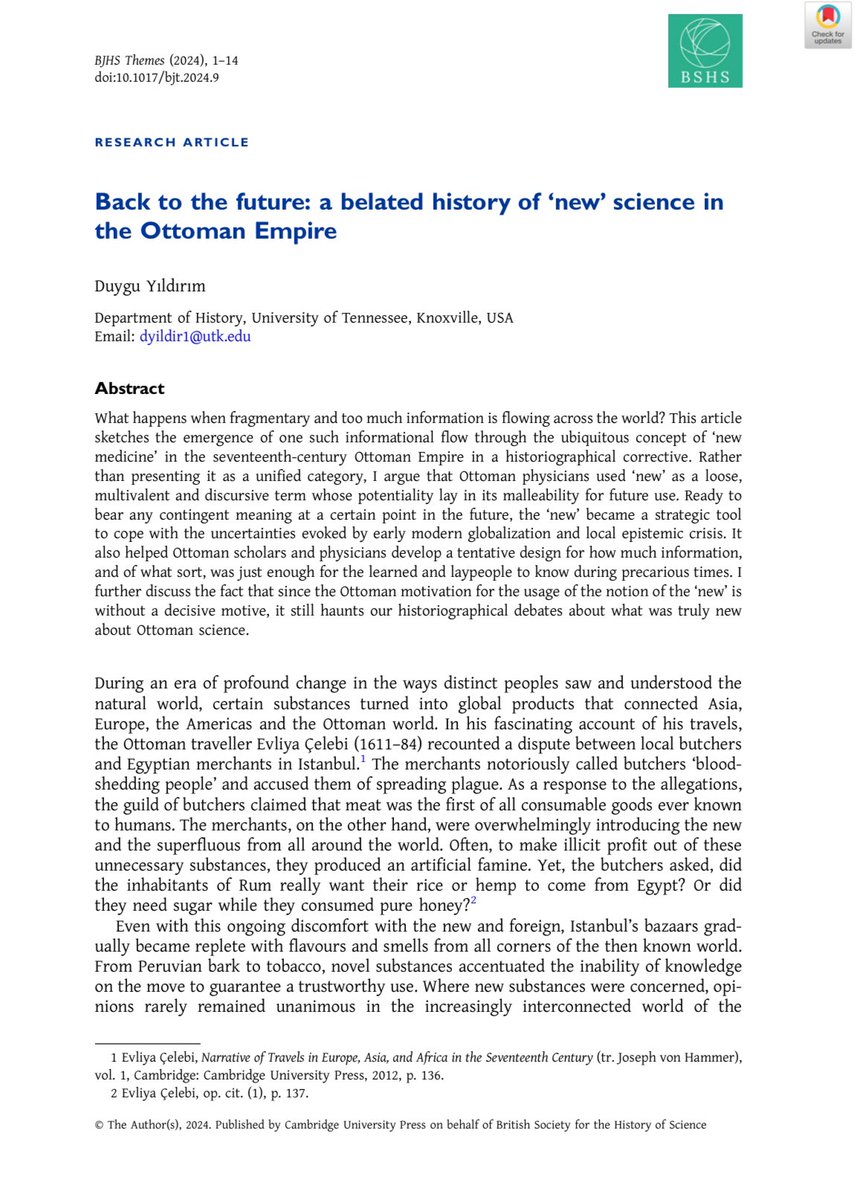
Duygu Yıldırım
@HistorianDiary
Asst Professor of History @UTKnoxville | PhD @Stanford | Historian of science and medicine | Early Modern Mediterranean | Writing a book on uncertainty
Excited to share my latest article, “Back to the future: a belated history of ‘new’ science in the Ottoman Empire” published in @BJHSeditor Themes‼️It is part of a special issue on global science. Check it out here: cambridge.org/core/journals/… #historyofscience #ottomanempire

I’ve been reading two novels this month, but I’m thinking of dropping them… Any new fiction recommendations you’ve found especially engaging recently?
Vico and the Maker's Knowledge Tradition by Maurizio Esposito Argues that Vico envisioned a non-Cartesian version of modernity, where praxis, rather than reason, drives human history. 📚 cup.org/4kPUmgh #earlymodern #rentwitter
In my book chapter, I wrote about the randomness of early modern knowledge exchanges. One comment captured it perfectly: “like the kind of exchange you have while picking up a bagel at your local shop, knowledge is made not just in conferences, but in everyday encounters” 🥯
Suat Derviş'in her kitabından etkilendim ama Bu Roman Olan Şeylerin Romanıdır'ı ayrı yere koyarım. Türkiye kapitalist patriyarkasının tarihinden müthiş bir kesit. Sömürü ve şiddetin ortasında "makbul" olmak ve olmamak arasındaki incecik çizgide yaşamını sürdüren kadın işçiler...
Kitaplarında kadınlar, silik birer figür değil, hayata damga vuran kuvvetli karakterlerdi. İstanbul'u, emekçilerin kokusuyla tüm yazılarında nakşetti. Yaşamın zorluklarını, neşesini hep sınıfsal bir perspektifle imledi. Suat Derviş, 53 yıl önce bugün vefat etti. Sevgiyle 🍀...
Her gün ayrı bir skandal…
#SonDakika Eskişehir’de orman yangınına müdahale ederken alevlerin arasında kalan 11 orman işçisi hayatını kaybetti birgun.net/haber/eskisehi…
It’s almost that time of year: “Professor, I can’t find the syllabus, can you send it?”
There’s some great discussion happening over on Bluesky in response to my question.
Maybe some historians (and philosophers) contribute: I’m discussing with a colleague (based on my book chapter) when knowledge began to be presumed as progressing linearly. One answer is the late 19th century, another says post-1750s. But what about the 17th century?
Aklıma ilkokulda yazıp sınıfta okuduğum şiir geldi: “Kütüphane kütüphane diyorsun Başımın etini yiyorsun Pekiyi neden kütüphaneye gitmiyorsun?”
“Life is short And the art long; The occasion is instant, Experiment perilous, Decision difficult.”
Buna aforizma değil de, görelilik teorisinden bihaber olmak diyelim…
dinlediğim podcastte diyor ki: 'tabiatta hiçbir şey acele etmiyor; ay acele etmiyor, güneş acele etmiyor, ama insan aceleci bir varlık, biz acele ettiğimizde ruhlarımız geride kalıyor.' çünkü bir yere vaktinden önce varmak, bir parçanı yolda bırakmak demek aynı zamanda
The new academic year starts in less than a month and I’ve yet to experience this so-called “summer break.”
OPEN ACCESS 🏆 Fatimid Cosmopolitanism: History, Material Culture, Politics and Religion, eds. Gregory Bilotto, Farhad Daftary, Shainool Jiwa (I.B. Tauris, July 2025 ) facebook.com/MedievalUpdate… bloomsbury.com/uk/fatimid-cos… #medievaltwitter #medievalstudies #medievalislam
Bu şarkının ne kadar güzel olduğunu unutmuşum; ya da ben İstanbul’u çok özledim. Hasret music.youtube.com/watch?v=kPyvAt… via @YouTubeMusic